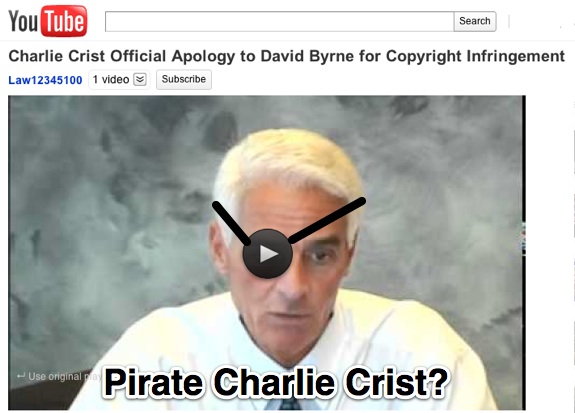Talking Heads Frontman David Byrne Sues Florida Gov. Charlie Crist For $1 Million
Rock icon and Talking Heads frontman David Byrne has sued Gov. Charlie Crist of Florida because Crist used the Talking Heads’ song “Road to Nowhere” in a Senate campaign ad without permission. In his May 16th, 2010 blogpost, Byrne - who blogs as well as he sings - explains that using songs in political ads, without permission, implicates moral and legal rights.
David Byrne does a great job of explaining how, under our system of law, authors of original works have a big say in how their works are used. If you're interested in this topic, you may want to read David Byrne's post and then return here to read a bit more. When it comes to using music clips in films, the law is complicated.
Let's start with the easy stuff: Musicians can't refuse other musicians who want to record purely musical versions of their compositions. In other words, your band has the right to cover David Byrne's music as long as you pay him when you publicly perform or distribute copies of your version of “Road to Nowhere”. Even if you suck, or perform in Nazi regalia, it's unlikely that David Byrne could stop you from performing his songs as long as your performances are not filmed and you pay the statutory rate for the copies you distribute.
But using someone else's music IN A FILM requires permission. So even if Charlie Crist was willing to pay, or your Nazi band wanted to make a music video of "Road to Nowhere" and pay David Byrne a million dollars, David Byrne could refuse.
Here's why:
Under the US Copyright law, to synchronize someone else's music with your film, you need permission from the author. And, if you intend on using an existing recorded version of that music, you'll also need permission from the owner of the master recording to make and distribute copies of that recording as part of your film.
So you generally need 2 licenses to use someone else's music in a film: A so-called "sync" license from the author of the composition - generally obtained from a publishing company - and a "master use" license - generally obtained from the record company that owns the master recording.
The prices for these license can vary. Some authors (like David Byrne) give film students free sync licenses. But David Byrne (and most other music composers) will charge commercial filmmakers whatever the market will bear. And commercial filmmakers often pay big fees for hit songs, because hit songs can have a big impact in films and filmmakers know it is perfectly legal for the authors to simply refuse to license their works to films ("I'm the author and you're a big film studio, so, until you offer $100,000, the answer is no.").
Once you have a sync license, you can record another version of the composition yourself - or you can negotiate with a record company to get the master use license. But, again, there is no statutory rate for the use in a motion picture of music that someone else has recorded, and record companies can (and do) ask for whatever they want for a master use license.
Unless you fall under the narrow Fair Use exception (which I discuss in class and elsewhere on this blog), or the music is in "the public domain," which generally means it dates back to before 1923, filmmakers need to understand how the law works when it comes to using recorded music in your films. As, David Byrne's case against Gov. Crist shows, things can go very wrong when you synchronize someone's song to a moving picture without their permission.
Subscribe to:
Post Comments (Atom)
Randy Finch's Film Blog:
Thoughts from a film producer about making and distributing films.

No comments:
Post a Comment